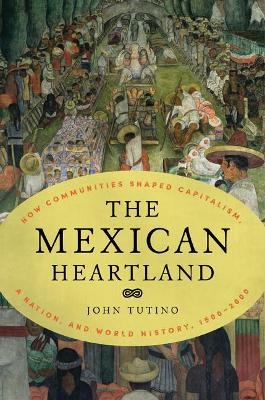
The Mexican Heartland
Princeton University Press (Verlag)
978-0-691-17436-5 (ISBN)
A major new history of capitalism from the perspective of the indigenous peoples of Mexico, who sustained and resisted it for centuries The Mexican Heartland provides a new history of capitalism from the perspective of the landed communities surrounding Mexico City. In a sweeping analytical narrative spanning the sixteenth century to today, John Tutino challenges our basic assumptions about the forces that shaped global capitalism--setting families and communities at the center of histories that transformed the world. Despite invasion, disease, and depopulation, Mexico's heartland communities held strong on the land, adapting to sustain and shape the dynamic silver capitalism so pivotal to Spain's empire and world trade for centuries after 1550. They joined in insurgencies that brought the collapse of silver and other key global trades after 1810 as Mexico became a nation, then struggled to keep land and self-rule in the face of liberal national projects. They drove Zapata's 1910 revolution--a rising that rattled Mexico and the world of industrial capitalism.
Although the revolt faced defeat, adamant communities forced a land reform that put them at the center of Mexico's experiment in national capitalism after 1920. Then, from the 1950s, population growth and technical innovations drove people from rural communities to a metropolis spreading across the land. The heartland urbanized, leaving people searching for new lives--dependent, often desperate, yet still pressing their needs in a globalizing world. A masterful work of scholarship, The Mexican Heartland is the story of how landed communities and families around Mexico City sustained silver capitalism, challenged industrial capitalism--and now struggle under globalizing urban capitalism.
John Tutino is professor of history and international affairs and director of the Americas Initiative at Georgetown University. His books include Making a New World: Founding Capitalism in the Bajio and Spanish North America and From Insurrection to Revolution in Mexico: Social Bases of Agrarian Violence, 1750-1940 (Princeton).
Introduction Capitalism and Community, Autonomy and Patriarchy 1
I Silver Capitalism, 1500-1820 29
1 Empire, Capitalism, and the Silver Economies of Spanish America 31
2 Silver Capitalism and Indigenous Republics: Rebuilding Communities, 1500-1700 57
3 Communities Carrying Capitalism: Symbiotic Exploitations, 1700-1810 91
4 Communities Challenging Capitalism: Insurgency in the Mezquital, 1800-1815 119
5 Insurgencies and Empires: The Fall of Silver Capitalism, 1808-21 146
II Industrial Capitalism, 1820-1920 171
6 Mexico in the Age of Industrial Capitalism, 1810-1910 173
7 Anahuac Upside Down: Chalco and Iztacalco, 1820-45 211
8 Commercial Revival, Liberal Reform, and Community Resistance: Chalco, 1845-70 237
9 Carrying Capitalism into Revolution: Making Zapatista Communities, 1870-1920 261
10 Capitalism Constraining Revolution: Mexico in a World at War, 1910-2000 294
III National Capitalism And Globalization, 1920-2000 319
11 Mexico and the Struggle for National Capitalism, 1920-80 321
12 After Zapata: Communities Carrying National Capitalism, 1920-80 349
13 Building the Metropolis: Mexico City, 1940-2000 375
Epilogue After the Fall (of Autonomies): Globalization without Revolution 402
Acknowledgments 419
Appendix 423
Abbreviations used in Citations and Bibliography 433
Notes 434
Bibliography 469
Index 491
| Erscheinungsdatum | 29.01.2018 |
|---|---|
| Zusatzinfo | 17 Maps |
| Verlagsort | New Jersey |
| Sprache | englisch |
| Maße | 152 x 235 mm |
| Gewicht | 794 g |
| Themenwelt | Geisteswissenschaften ► Geschichte ► Allgemeine Geschichte |
| Geisteswissenschaften ► Geschichte ► Regional- / Ländergeschichte | |
| Geschichte ► Teilgebiete der Geschichte ► Kulturgeschichte | |
| Sozialwissenschaften ► Politik / Verwaltung ► Europäische / Internationale Politik | |
| Wirtschaft | |
| ISBN-10 | 0-691-17436-9 / 0691174369 |
| ISBN-13 | 978-0-691-17436-5 / 9780691174365 |
| Zustand | Neuware |
| Haben Sie eine Frage zum Produkt? |
aus dem Bereich


